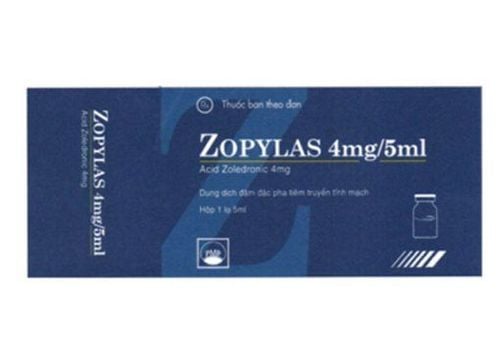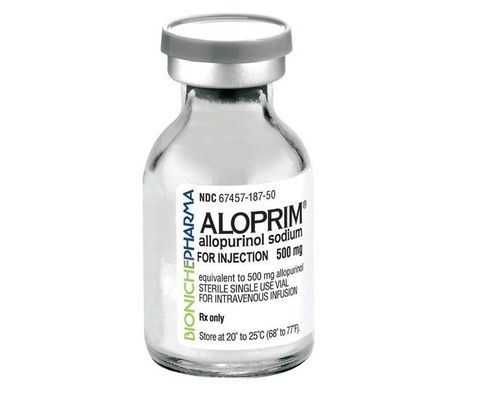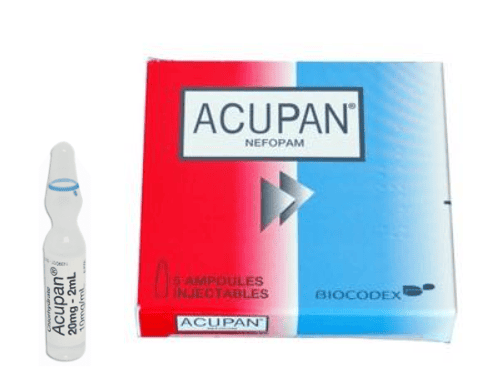This is an automatically translated article.
Zoledronic acid Fresenius is prepared as a concentrated solution for infusion in 100ml of calcium-free solvent (NaCl 0.9% or glucose 5%). The drug is used only as prescribed by a physician experienced in the use of intravenous bisphosphonates.
1. What drug is Zoledronic acid Fresenius?
What drug is Zoledronic acid Fresenius? The composition of Zoledronic acid Fresenius Kabi 4mg/5ml is zoledronic acid (as zoledronic acid monohydrate) with a concentration of 4mg/5ml. Zoledronic acid Fresenius is a drug for the prevention of bone-related events in adult patients with advanced malignancies, for the treatment of tumor-induced hypercalcemia, manufactured by Fresenius Kabi - Austria.
2. Indications - contraindications of Zoledronic acid Fresenius
Indications of Zoledronic acid Fresenius are used in the following cases:
Prevention of bone-related events (pathological fractures, spinal cord compression, bone events caused by radiation or bone surgery). , hypercalcemia as a side effect of the tumor) in adults with advanced malignancies involving bone; Treatment of patients with tumor-induced hypercalcemia. Zoledronic acid Fresenius is contraindicated in the following cases:
Patients with hypersensitivity to any component of Zoledronic acid Fresenius, or other bisphosphonates; Breastfeeding women.
3. How to take Zoledronic acid Fresenius
Zoledronic acid Fresenius is administered intravenously. Specifically, Zoledronic acid Fresenius concentrated solution will be diluted in 100ml of calcium-free solvent (NaCl 0.9% or glucose 5%) and infused intravenously over a period of not less than 20 minutes. Aseptic techniques should be followed during preparation of Zoledronic acid Fresenius infusions and single-use reconstitution. Use for infusion only when Zoledronic acid Fresenius solution is clear and free of cloudiness.
Note: When mixing, Zoledronic acid Fresenius solution should not be mixed with Calcium or infusion solutions containing cations such as Ringer Lactate solution. Zoledronic acid Fresenius is only used as a single dose, intravenously with a separate line.
Patients should be well hydrated before and after taking Zoledronic acid Fresenius .
The dose reduction regimen is applied in patients with mild to moderate renal impairment according to the doctor's order, the nurse performing the drug will withdraw an appropriate amount of Zoledronic acid Fresenius solution as follows and prepare it according to the instructions in the doctor's office. above.
4.4 ml Zoledronic acid Fresenius at a dose of 3.5 mg zoledronic acid; 4.1 ml Zoledronic acid Fresenius with a dose of 3.5 mg zoledronic acid; 3.8 ml Zoledronic acid Fresenius with a dose of 3.0 mg zoledronic acid.
4. Dosage of Zoledronic acid Fresenius Kabi 4mg/5ml
4.1. Dosage of Zoledronic acid Fresenius Kabi 4mg/5ml in the prevention of bone-related events in patients with advanced melanoma Adults and the elderly: The recommended dose of zoledronic acid for the prevention of bone-related events for advanced melanoma is 4 mg of zoledronic acid every 3 to 4 weeks. Should be supplemented with 500 mg of calcium and 400 IU of vitamin D daily during the use of the drug. When deciding to treat Zoledronic acid Fresenius in patients with bone metastases, consideration should be given to the fact that the therapeutic effect of zoledronic acid begins only after 2-3 months.
4.2. Dosage of Zoledronic acid Fresenius Kabi 4mg/5ml in the treatment of tumor-induced hypercalcemia: Adults and the elderly: The recommended dose of zoledronic acid in the treatment of hypercalcemia is a single dose of 4mg zoledronic acid.
4.3. Dosage of Zoledronic Acid Fresenius Kabi 4mg/5ml in Patients with Renal Failure Treatment of Tumor Hypercalcemia:
The treatment of zoledronic acid in patients with tumor-induced hypercalcemia with severe renal impairment should be considered as follows: once the benefits and risks have been assessed. No dose adjustment of Zoledronic acid Fresenius is required in patients with tumor-induced hypercalcemia with serum creatinine < 400 mol/l or < 4.5 mg/dl. Prevention of bone-related events due to advanced malignancy:
When zoledronic acid is initiated in patients with multiple myeloma or with metastatic bone lesions from solid tumors, serum creatinine and the patient's creatinine clearance. Zoledronic acid is not recommended for use in patients with severe renal impairment as determined by creatinine clearance <30 ml/min. In patients with bone metastases with mild-to-moderate renal impairment as determined by a creatinine clearance of 30-60 ml/min, the following dose of zoledronic acid is recommended: Creatinine clearance > 60 (ml/min) ): The dose of zoledronic acid 4.0 mg; Creatinine clearance 50-60 (ml/min): The recommended dose of zoledronic acid is 3.5 mg; Creatinine clearance 40-49 (ml/min): The recommended dose of zoledronic acid is 3.3 mg; Creatinine clearance 30-39 (ml/min): The recommended dose of zoledronic acid is 3.0 mg; After initiating treatment with Zoledronic acid Fresenius, patients should be assessed for serum creatinine before each dose of zoledronic acid and treatment should be discontinued as soon as renal function declines. Zoledronic acid treatment was continued only when creatinine levels returned to within 10% of their pre-treatment values with Zoledronic acid Fresenius.
4.4. Dosage of Zoledronic acid Fresenius Kabi 4mg/5ml in Pediatric Patients: The safety and efficacy of Zoledronic acid Fresenius in children 1 to 17 years of age have not been established, so dosing recommendations cannot be made. Zoledronic acid Fresenius used for this patient population.
5. Precautions when using Zoledronic acid Fresenius
Note when using Zoledronic acid Fresenius as follows:
Zoledronic acid should only be prescribed and used by healthcare professionals who have experience in using intravenous bisphosphonates. Patients should be evaluated prior to administration of Zoledronic acid Fresenius to ensure that the patient is adequately rehydrated, however excessive rehydration should be avoided in patients at risk for heart failure. Parameters related to hypercalcemia such as calcium, phosphate and magnesium levels should be carefully monitored after initiating treatment with Zoledronic acid Fresenius. If the patient has hypocalcaemia, hypophosphataemia, or hypomagnesaemia, additional treatment may be required for a short time. Patients with hypercalcaemia, if untreated, often lead to some degree of impairment in renal function, so renal function should be closely monitored. Zoledronic acid should not be used during pregnancy and women are advised to avoid pregnancy while being treated with zoledronic acid.
6. Side effects of Zoledronic acid Fresenius Kabi 4mg/5ml
6.1. Zoledronic acid Fresenius side effects are very common Hypophosphatemia. 6.2. Common side effects of Zoledronic acid Fresenius Anemia; Headache; Conjunctivitis ; Nausea, vomiting, decreased appetite; Bone - muscle - joint pain, body pain; CKD; Fever, flu-like syndrome; Increased creatinine and blood urea; Decreased blood calcium. 6.3. Uncommon side effects Thrombocytopenia, leukopenia; Hypersensitivity Anxiety, sleep disturbances Dizziness, taste disturbances, decreased tactile sensations; Blurred vision, eye inflammation; Raise/lower blood pressure, atrial fibrillation; Shortness of breath, cough, bronchospasm; Diarrhea/constipation, abdominal pain, difficulty digesting food, stomatitis, dry mouth; Muscle spasms, necrosis in the jawbone; Acute renal failure, hematuria; Asthenia, peripheral edema, infusion site reactions; Hypomagnesemia; Decreased blood potassium.
7. Zoledronic acid Fresenius drug interactions
The drug interactions of Zoledronic acid Fresenius are as follows:
Care should be taken when using bisphosphonates with aminoglycoside antibiotics, calcitonin or loop diuretics, as this may lead to lower serum calcium levels in the long term. Caution should be exercised when Zoledronic acid Fresenius is used with nephrotoxic drugs, paying attention to the potential for hypomagnesaemia in treatment. In patients with multiple myeloma, the risk of renal dysfunction is increased when Zoledronic acid Fresenius is used in combination with thalidomide. Caution should be exercised when Zoledronic acid Fresenius is co-administered with antiangiogenic agents, as an increased incidence of osteonecrosis of the jaw has been observed in patients treated concomitantly with Zoledronic acid Fresenius and other products. this medicinal product. Zoledronic acid Fresenius is prepared as a concentrated solution for infusion in 100 ml of a calcium-free solvent. Medicines are used as prescribed by the doctor, so patients need to follow the instructions exactly, to avoid unwanted side effects.
Follow Vinmec International General Hospital website to get more health, nutrition and beauty information to protect the health of yourself and your loved ones in your family.
Please dial HOTLINE for more information or register for an appointment HERE. Download MyVinmec app to make appointments faster and to manage your bookings easily.













